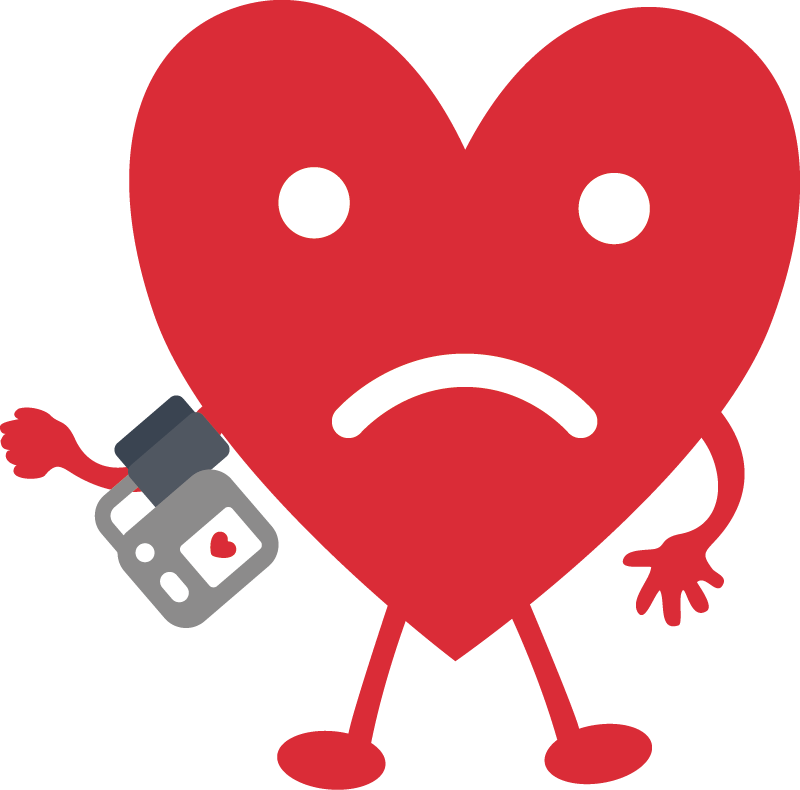Living healthily with a happy heart
It’s never too late to make positive changes to how you live your day to day life. There are huge benefits to stopping smoking, being more active, limiting alcohol intake and eating more healthily.




It’s time to give up smoking
Smoking
Giving up smoking is the single biggest thing you can do to improve your heart health.
That’s because people who smoke are twice as likely to have a heart attack as those who don’t smoke.
Hopefully you will feel the health and financial benefits of stopping smoking, including:
- reducing the risk of developing illnesses and death caused by cancer, heart and lung disease – 90 per cent of all cases of lung cancer are caused by smoking;
- getting rid of the nicotine in your body: after stopping smoking for 48 hours there is none left, which will make a huge difference to your sense of smell and taste;
- improved fitness levels making it easier to run or play with your children, family or friends;
- saving money: giving up a 20-a-day habit will save you over £4,000 in a single year!
Some tips to help you quit:
- Call your local free stop smoking service (official statistics show you are three times more likely to quit if you use a smoking cessation service, where they will provide support such as psychosocial behavioural support.
- Write down all the reasons you want to stop and stick it on the fridge to help you stay motivated.
- Keep yourself busy.
- Talk to your friends, family and workmates – support from them is essential. Why not quit together to help keep each other motivated?
- Vaping to quit smoking – Nicotine vaping is substantially less harmful than smoking, however vaping is not completely harmless and we only recommend it for adult smokers. To support quitting smoking and staying quit, visit here.


Do you have a healthy diet?
Healthy diet
We recommend eating a healthy, balanced, high-fibre diet – that includes plenty of fresh fruit and vegetables (five portions a day) and whole grains.
Too much salt will increase your blood pressure, so it’s best to limit the amount of salt you eat to no more than about a teaspoon (6g) a day.
There are two types of fat: saturated and unsaturated. You should avoid food containing saturated fats because these will increase the levels of bad cholesterol in your blood.
Foods high in saturated fat include:
- meat pies
- sausages and fatty cuts of meat
- butter
- ghee, a type of butter often used in Indian cooking
- lard
- cream
- hard cheese
- cakes and biscuits
- foods that contain coconut or palm oil
A balanced diet should still include unsaturated fats, which increase levels of good cholesterol and help reduce any blockage in your arteries. Foods high in unsaturated fat include:
- oily fish
- avocados
- nuts and seeds
- sunflower, rapeseed, olive and vegetable oils
You should also try to avoid too much sugar in your diet as this can increase your chances of developing diabetes, which is proven to dramatically increase your chances of developing Coronary Heart Disease (CHD).
Read more about:


Physical activity
There’s wide ranging benefits of being physically active but many of us struggle to meet the recommended physical activity levels. But simple changes can make a big difference
Whatever your age, there’s strong scientific evidence that being physically active can help you lead a healthier and happier life.
People who are active regularly are less likely to develop many chronic diseases, such as heart disease, type 2 diabetes, stroke, and some cancers.
Research shows that physical activity can also boost self-esteem, mood, sleep quality and energy. It can also reduce the risk of developing stress, depression, dementia and Alzheimer’s disease.
Physical Activity for Adults InfographicWhat counts?
To stay healthy, adults should try to be active every day and try to be physically active (through a variety of activities) for at least 20 minutes a day.
young people (five to 18)
adults (19 to 64)
older adults (65 and over)
If you are looking for information on early childhood (under 5 years old) please see here.
For most people, the easiest way to get moving is to make activity part of everyday life. Why not walk or cycle instead of using the car to get around? The more you do, the healthier you’ll feel, while taking part in activities such as sports and exercise will make you even healthier.
For any type of activity to benefit your health, you need to be moving quick enough to raise your heart rate, breathe faster and feel warmer. This level of effort is called moderate intensity activity. One way to tell if you’re working at a moderate intensity is if you can still talk but you can’t sing the words to a song.
If your activity requires you to work even harder, it is called vigorous intensity activity. There is substantial evidence that vigorous activity can bring health benefits over and above that of moderate activity.
Some individuals are eligible for exercise on prescription depending on your local area, please refer to the below links or contact your local authorities to find out more information on this.
You can tell when it’s vigorous activity because you’re breathing hard and fast, and your heart rate has increased quite a bit. If you’re working at this level, you won’t be able to say more than a few words without pausing for breath.
There’s lots of information about building up and maintaining your fitness on the Live Well pages at NHS Choices.
Click below to find out if you’re doing enough for your age:
- early childhood (under five years old)
- young people (five to 18)
- adults (19 to 64)
- older adults (65 and over)


Weight Management
Firstly it is important to know and understand your Body Mass Index (BMI). BMI is a measure that uses your height and weight to work out if your weight is healthy. Find out more about BMI here.Find out more about BMI here.
Have a look at the NHS BMI healthy weight calculator to help you decide.
If you’d like support to help you lose weight please contact your local services, or get started on the NHS weight loss plan.
You can also download the NHS weight loss plan to your smartphone or ask your general practice to refer you to the NHS Digital Weight Management Programme.
View BHF Leaflet for more

Controlling Diabetes
People with diabetes have a higher chance of developing cardiovascular disease.
Diabetes makes it difficult for the body to control blood sugar levels. High blood sugar levels can damage blood vessels and cause a range of complications such as heart attack, heart failure, stroke and angina.
If you have diabetes make sure that you have all of your regular check-ups with your doctor and/or practice nurse. These include:
- measuring your blood glucose level (HbA1c), blood pressure and cholesterol level
- retinal (eye) screening
- foot and leg check
- blood and urine testing (to check kidney function)
- weight check
- smoking status
You can find out more information about diabetes and cardiovascular disease from:
Diabetes UK
British Heart Foundation
Diabetes Prevention Programme


Reducing alcohol
Do you know how much you are drinking? Keep a drinks diary for a week to help you find out. You might be surprised!
Drinking more than the recommended units of alcohol can have a harmful effect on your heart and on your health generally.
It can cause abnormal heart rhythms, high blood pressure, heart failure, as well as stroke, liver problems and some cancers.
This tool has been designed by clinical psychologists and behavioural scientists, which offers advice and scientifically-proven tools to reduce drinking to the recommended limit of 14 units a week or less.
Find out more about managing the amount of alcohol you drink at NHS Choices.
If you think you may have a problem with the amount of alcohol you drink, contact your local drug and alcohol service.


Managing Stress / Healthy Mind
Stress contributes to high blood pressure, which is also a risk factor for heart attack and stroke.
Spotting the early signs of stress will also help prevent it getting worse and potentially causing serious complications, such as high blood pressure.
If you’re struggling with stress, there’s lots of useful information about how to manage it at NHS Choices. Get help with stress – NHS (www.nhs.uk)
Visit Kind to Your Mind

Sleep
Sleep is important to our hearts.
Adults who regularly sleep fewer than 6 hours per night have a 13% increased mortality risk and 7% for 6-7 hours per night.
Insufficient sleep linked with 7 of the 15 leading causes of death:
- cardiovascular disease
- malignant neoplasm (breast cancer)
- cerebrovascular disease
- accidents
- diabetes
- septicaemia
- hypertension
Increased risk of hypertension
Those with habitually short <5 or long >9hrs sleep are more likely to develop hypertension than those sleeping 7-8 hours.
Increased risk of obesity
Leptin (a hormone that is produced by fat cells and signals the brain to decrease appetite) reduces and ghrelin (a hormone that is produced by the stomach and signals the brain to increase appetite) increases with poor sleep and these increase appetite. 5hrs or less increases ghrelin by 15% and decreases leptin by 15%
Increased risk of Type 2 Diabetes
Sleeping for too long or too short a time is associated with diabetes risk in adulthood
Increased risk of heart attacks
Studies have found that people sleeping less than six hours per night had a 20% higher chance of a heart attack
Infections
Less than 6 hours sleep = 3-4 times as likely to catch a cold.
Websites
Adult obesity: applying All Our Health
View
Adult smoking habits in the UK: 2019
View
Alcohol: applying All Our Health
View
Calculate your heart age
View
Cardiovascular disease prevention: applying All Our Health
View
Community-centred practice: applying All Our Health
View
Digital Weight Management
View
Improving access to greenspace: A new review for 2020
View
Kind to your Mind
View
Lower my drinking app
View

